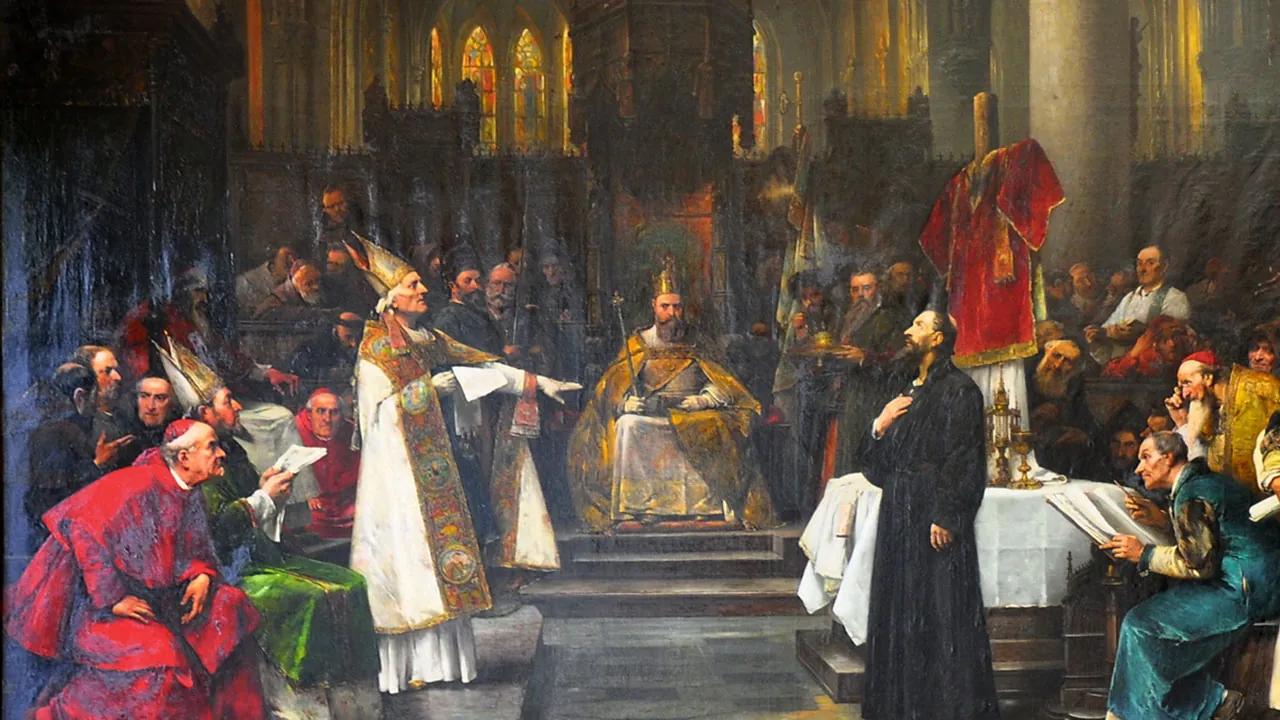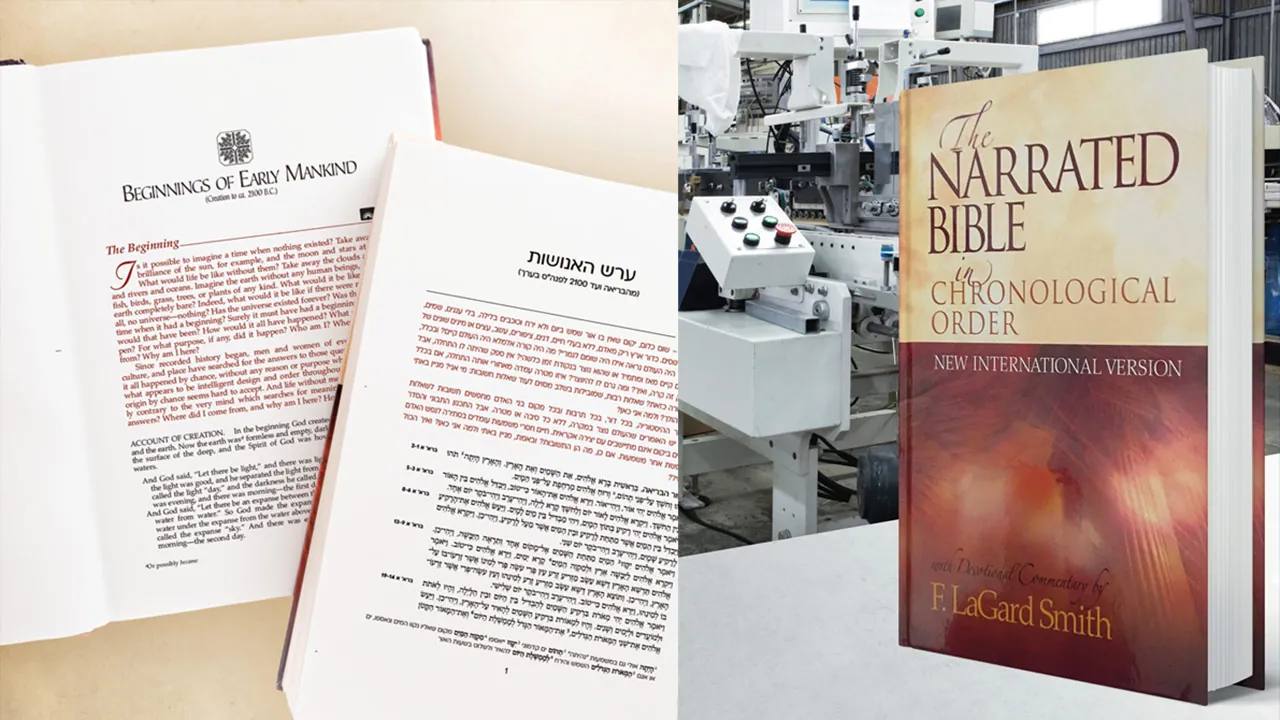
- More Articles in this Series:
- Part 1: The Power of God’s Word
- Part 2: The Rise and Fall of the Word of God
- Part 3: When the Word of God Ceased to Exist
When religion ruled, the Western World went dark. When the Word of God reappeared, nations arose to create the most advanced civilizations ever. This is the story.
In the year 393 A.D., devout men of God studied the many manuscripts circulating among the churches. They were separating those writings they could certify as genuinely written by the original apostles of Yeshua from the unverifiable manuscripts. Only 27 books would be included in the New Testament. Certainly, much research and prayer went into making such momentous historical decisions.
Even before the New Testament was formally completed as a book, Emperor Constantine had ordered 50 Greek Bibles to be distributed to the various growing churches in Constantinople, his capital. For a short time, the Word of God in Latin and Greek spread rapidly. But when the Roman Empire collapsed (476 A.D.), and the Church took over the government, everything began to change.
A secular Huffington Post journalist noted,
“Wouldn’t you assume that the newly established Church [by Emperor Constantine] would want its devotees to immerse themselves in the sanctioned New Testament, especially since the Church went to great lengths to eliminate competing Gospels? And wouldn’t the best way of spreading the ‘good news’ be to ensure that every Christian had direct access to the Bible?
That’s not what happened. The Church actually discouraged the populace from reading the Bible on their own – a policy that intensified through the Middle Ages and later, with the addition of a prohibition forbidding translation of the Bible into native languages.” 1

THE PLUNGE INTO ILLITERACY
Other events kicked in that inadvertently slowed the copying of the Bible for the Christian world. Rome divided into two empires, with Rome and Constantinople the two capitals. The overthrow of Rome was not far behind. Latin faded away, replaced by many local European languages. In the Eastern part, known as the Byzantine Empire, Greek became the official language of the elite – but there, too, were many other local languages spoken by the masses.
Bibles continued to be handwritten in Latin and Greek. But most citizens could not read either language. Generally speaking, only highly educated officials and the rich were literate.
Over the centuries, the Roman Catholic Church didn’t promote schooling even among their monks. That meant there was a dearth of educated religious scholars. These poorly educated monks were left to copy the Scriptures in Latin even if they weren’t fluent in the language.
“Interestingly, the Christian theologians that did have enormous influence on Christian culture such as Augustine, Jerome, Tertullian and later on Wycliffe, were all highly educated in universities before they became monks.” (This fact is a lesson for now, as today’s universities churn out mostly godless professors, politicians and intellectuals. Education matters – for good or for evil.)2

EDUCATION FOR THE RICH ONLY
During the darkest of the Dark Ages, there were no schools for the poor; however, there was education in many cities and towns for the children of the rich. Oxford and Cambridge grew into universities before 900 A.D.; in 1320 there were 30,000 students at Oxford! Universities existed in Italy, France and Germany – all of which taught Latin.
By the late Middle Ages, production of both religious and secular texts passed to professional copyists. Booksellers placed shops near the universities and cathedral schools, and so the book trade blossomed. Of course, because most people in the Middle Ages were illiterate, picture Bibles full of wonderful illustrations became popular.
Because of the huge size of complete Bibles, they were divided into several volumes, and each was very costly. Only the rich, cathedrals and universities could afford them.
Since so few could read, and since Bibles were incredibly expensive, the Catholic authorities had comfortably come to the conclusion that their parishioners really had little need for the Scriptures themselves. This deprivation would then become law.
STARVING THE SHEEP
So it was for 1,000 years, that the Roman Catholic authorities, with their popes and their councils forcibly took the Word of God from the sheep for which they had responsibility. In doing this, Roman Catholics (who condemned the Jews for their behavior historically) proved that the actions of the Jewish leaders – control and corruption – were simply human nature. The Roman Catholics were committing exactly the same sin that Jeremiah the prophet had accused the Jewish leaders of in bygone times.
As the centuries passed, the domination and control over the people of Europe and everywhere the Church ruled became more extreme. To translate the Bible into one of the local languages became a crime that could cost a scholar his life – by the sword of the Roman Catholic Church.
Decree of the Council of Toulouse (1229 C.E.): “We prohibit also that the laity should be permitted to have the books of the Old or New Testament; but we most strictly forbid their having any translation of these books.”
Ruling of the Council of Tarragona of 1234 C.E.: “No one may possess the books of the Old and New Testaments in the Romance language, and if anyone possesses them he must turn them over to the local bishop within eight days after promulgation of this decree, so that they may be burned…”
With the Word of God forcibly seized from citizens by the authorities with strict regulations to eliminate “heretics,” and forbidding the translation of the Bible into the peoples’ mother tongues, sin conquered the Church, starting with the leaders and ending with the Christian world.
A COURAGEOUS VOICE ARISES
But there was always an underground stirring and yearning to read the Bible. Many attempts were made to translate the Bible into different languages, but the translators were caught by the Church and punished as heretics. Even in the 10th century, a Bible scholar who actually managed to remain anonymous dared to put the Gospels into English. But he could only circulate it privately because it was forbidden throughout Christendom.
Still others in different European countries tried secretly to translate portions of the Bible. Peter Waldo commissioned a translation in France until the Church excommunicated him in 1184.
His followers, called Waldensians, branched out all over Europe and waged an underground campaign to get the Bible to the people. For centuries, the Church launched an endless inquisition to stop their preaching and handing out Bibles; the group was nearly annihilated in the 17th century.
But some had escaped to Italy, France, Spain and Germany. Influenced by them, citizens of these countries joined together in the 13th and 14th centuries to demand complete Bibles in their own languages.
And as Providence would have it, the vernacular languages in Europe now had enough fluidity, precision, breadth of word choice and beauty to support great and memorable versions of Scripture in the people’s native languages.3

JOHN WYCLIFFE 1328 – 1384
On the stage appeared a great revolutionary named John Wycliffe, whose central doctrine was, “Every Christian ought to study this book because it is the whole truth!” He was a professor and theologian from Oxford University and the first to translate the New Testament into English to “… helpeth Christian men to study the Gospel in that tongue in which they know best Christ’s sentence.”
The Church condemned Wycliffe, but Oxford University shielded him from arrest. He also lashed out against the power and riches of the Church establishment and became a very popular leader at Oxford. As a renowned theologian, he was called in to advise parliament in its negotiations with the pope.
This was a world in which the Church was all-powerful, and the more contact Wycliffe had with Rome, the more indignant he became. The papacy, he believed, reeked of corruption and self-interest and he was determined to do something about it.
Wycliffe firmly believed the Bible should be available to everybody. He saw literacy as the key to the emancipation of the poor. Ordinary people, who neither spoke Latin nor were able to read, could only learn about their faith from the clergy, who obviously had their own agenda.
Inevitably, because of pressure from the papacy, he was condemned by the archbishop of Canterbury and was fired from Oxford. However, his conviction of the authority of the Bible rather than the pope stirred great controversy.
He continued with the translation of the whole Bible into English, and though he died three years later, his group of scholars finished the entire Bible in 1395. Despite the church’s efforts to suppress the Bibles, the common people were at last beginning to have an opportunity to read God’s Word.
For this “heresy” Wycliffe was posthumously condemned by Arundel, the archbishop of Canterbury. By the Council’s decree “Wycliffe’s bones were exhumed and publicly burned, and the ashes were thrown into the Swift River.”

Right: Jan Hus, 16th century. Artist unknown. Credit: Wikipedia
JAN HUS 1372 – 1415
At the same time, there were already other educated men of God rising up in different areas of Europe, demanding that the people receive a Bible in their own language. They paid with their lives.
Jan Hus was a Czech theologian from the University in Prague. He is considered the second church reformer after John Wycliffe. He was ordained and became a preacher in Bohemia. But the big change he underwent was when he discovered the Bible. He testified that he left behind stupidity and foolishness “when the Lord gave me knowledge of Scriptures.”
The writings of John Wycliffe had stirred his interest in the Bible. He wanted to place more emphasis on the Bible. Becoming a reformer, he proposed expanding the authority of local church councils – which meant lessening that of the pope! He felt driven to clean up the moral decay of the clergy. He began preaching such ideas as trusting in the Scriptures, “desiring to hold, believe, and assert whatever is contained in them as long as I have breath in me.”
Meanwhile, there were three elected popes, each claiming they were the legitimate pontiff. One of the three popes excommunicated Hus and forbad him to preach. Seeing the utter moral decadence of the papacy, including the accursed indulgences trafficked by the popes to fill their treasury, Hus leaned even more heavily on the Bible which he proclaimed the final authority for the Church.
He spent two years feverishly composing a number of treatises, one of which was called, “The Church.” In it he argued that “Christ alone is head of the church…and to rebel against an erring pope is to obey Christ.”
In November 1414, the Council of Constance assembled, and he was brought before a kangaroo court which sentenced him to death. His response was, “I appeal to Jesus Christ, the only judge who is almighty and completely just. In his hands I plead my cause, not on the basis of false witnesses and erring councils, but on truth and justice.”
He was burned at the stake in 1415, his ashes tossed into a lake so that nothing would remain of the “heretic.” Out of those ashes arose a strong Bible-based movement, the Moravian Brethren, who sent out many hundreds of missionaries around the world and played an influential role in the conversion of the Wesley brothers, among others. In fact, the Moravian missionaries were the first large-scale Protestant missionary movement, and it still remains a denomination today.

GUTENBERG PRESS 1450
In the fullness of time, the greatest tool for spreading the Word of God since the Bible was written was invented. It surely was a gift the angels in heaven had been waiting for! The Gutenberg printing press went into operation in the year 1450. Within four years, the first Bible was printed. It was none other than the Vulgate Roman Catholic Bible in Latin – because still, it was only the rich and elite who could read, and the Vulgate was the only Bible widely known. But the Gutenberg printing press brought one of the greatest shifts for all mankind. It was the catalyst that birthed a renewal of true faith in God, the advancement of education and unprecedented prosperity.
The printing press would quickly become the Catholic Church’s greatest enemy, because soon Bibles were being printed much faster than the Church could burn them. Nevertheless, it also became a catalyst in the Roman Catholic Church itself, whether desired or not, to slowly break the chains of imprisonment of the Bible to its own members.
But the war over the free usage of the Word of God in many languages was far from over.
The same struggle continues in modern Israel where very few of God’s chosen people have access to the Word of God in a language they can understand. Today, you can help bring a new life-giving, readable Bible in Hebrew to the Israeli people. In it, they will have the opportunity to become aware of the depths of God’s love for them, as revealed in His own Word.
The final part of this series will appear in the February issue of The Maoz Israel Report.
1. http://b.link/huffpost-article
2. http://b.link/jstor-article
3. http://b.link/waldensians

Happy Passover!

What is a Promised Land?

The Scariest Parable in the Bible

Restoration of Our Land

What Makes this Hebrew Bible Different From All Others?

Two Miracles and a Message

Narrating Hope

Hope in Action

Fight to the Finish


